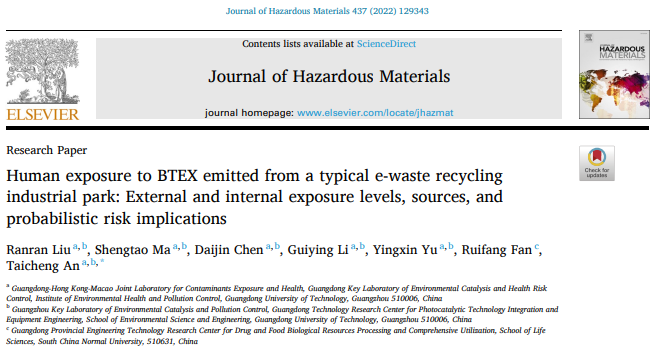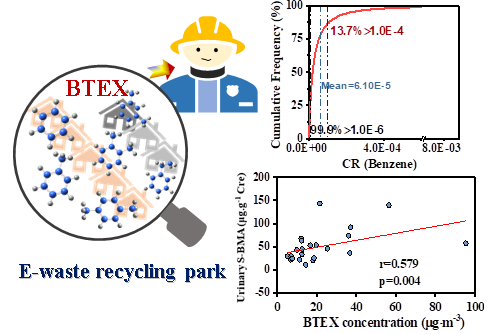近日,广东工业大学环境健康与污染控制研究院、环境科学与工程学院安太成教授团队题为《Human exposure to BTEX emitted from a typical e-waste recycling industrial park: external and internal exposure levels, sources, and probabilistic risk implications》的学术论文在环境领域顶尖国际期刊Journal of Hazardous Materials(2022, 437:129343)杂志上发表。论文第一作者为博士后刘冉冉,通讯作者为安太成教授。该研究以我国某典型电子垃圾回收工业园区为研究区域,对园区内外环境大气中BTEX的污染水平及其污染特征进行详细数据分析,探讨了电子垃圾职业拆解工人的苯系物(BTEX)实际内暴露水平与其外暴露水平的相关性,揭示了BTEX对职业暴露人群基于内外暴露水平的累积致癌风险。本研究可以为减少电子垃圾拆解回收过程BTEX暴露和健康影响提供了重要科学依据。

论文DOI:https://doi.org/10.1016/j.jhazmat.2022.129343
电子垃圾回收对环境和经济提供了可持续性发展的必然性,但是电子垃圾的污染问题存在着很大的挑战。目前对电子垃圾回收造成的环境污染研究主要集中在各种持久性有机污染物的排放特征,而对从业人群的内暴露的关注较少。因此,本研究主要基于前期的研究基础,系统开展了电子垃圾拆解园区中BTEX的污染排放特征和职业工人的内外暴露方面的评估研究。结果表明:电子垃圾拆解职业工人暴露于高浓度的BTEX,其中尿液BTEX代谢产物的中值浓度比未代谢BTEX的中值浓度高约6个数量级,即在此暴露水平下,BTEX在工人体内进行了有效的代谢,进而导致了不同的内外暴露特征和浓度差异。研究发现甲苯是工业园区环境大气中最主要的同系物,苯在尿液中未代谢BTEX中含量最高,甲苯的代谢物在所有BTEX代谢产物中占绝对优势。进一步研究表明:尿液代谢产物中N-乙酰基-S-苄基-L-半胱氨酸(S-BMA)的浓度与环境大气中BTEX同系物的浓度均呈现显著的正相关。BTEX的吸入暴露可导致95.2%的职业工人造成累积致癌风险,基于苯的代谢暴露水平评估发现99.9%的职业工人的致癌风险超过1.0E-6。该研究成果对于电子垃圾园区职业工人的健康保护提供一定的基础数据。
论文网址:https://www.sciencedirect.com/science/article/pii/S0304389422011360?via%3Dihub
图文摘要

论文的英文摘要附如下:
ABSTRACT:
Benzene, toluene, ethylbenzene, and xylene (BTEX) can be released during extensive activities associated with the disposal of electronic waste (e-waste), which might pose deleterious health effects on workers. In this study, pollution profiles of BTEX in air and their urinary excretive profiles in occupational workers were investigated in a typical e-waste recycling industrial park. The results showed that the workers in the park were generally exposed to high levels of BTEX. The median levels of urinary metabolites were approximately 6-orders of magnitude higher than those of unmetabolized BTEX, indicating that pollutants efficiently metabolize at those occupational levels. The analytes presented differential profiles in external and internal exposure. Among the metabolites, significant correlation (p < 0.05) was observed between N-acetyl-S-benzyl-L-cysteine (S-BMA) concentration and atmospheric individual BTEX derived from the e-waste recycling area, suggesting that S-BMA is a potential marker for BTEX exposure to e-waste occupational workers. Notably, 95.2% of all the workers showed a cumulative carcinogenic risk induced by BTEX exposure via inhalation, with 99.9% of the carcinogenic risk distribution based on concentration of benzene metabolite (N-acetyl-S-(phenyl)-L-cysteine) exceeding 1.0E-6. This study holds potential in providing valuable inferences for the development of remediation strategies focusing on BTEX exposure reduction to protect workers’ health at e-waste recycling industries.